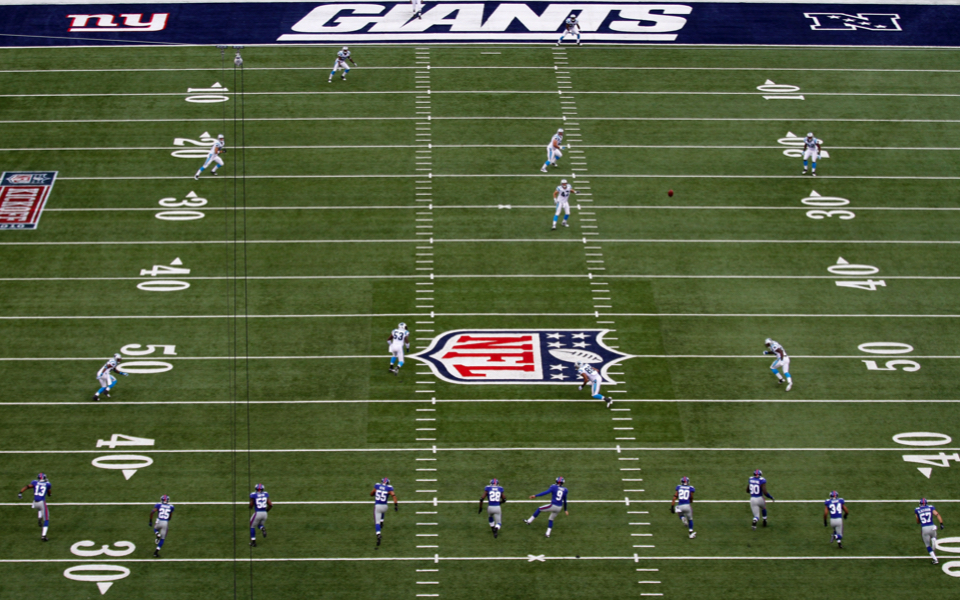The NFL formula and ideas for Greece

We have lately become somewhat used to seeing professional American football as a battlefield not only for athletes, but also for broader cultural and political issues, like domestic violence and political dissent in the workplace. But the most instructive parallel we can draw from the National Football League is not to the culture wars, but to the American economy. Even after a lengthy recovery, the US economy seems incapable of generating broad prosperity. The NFL, despite controversies that have hurt viewership, remains extraordinarily competitive and profitable. This is due to three rules that the league’s billionaire owners willingly live under. Sports team owners in Greece live under a different, and not so strict, set of rules.
The first rule is that teams in the biggest metro areas, with the largest fan bases and media markets, have to share revenue with teams in smaller metro areas. The second is that the teams with the best win-loss records get the last draft picks, and vice versa. The third rule is that the season schedule is determined not by individual team preferences but by formulas overseen by the NFL which ensure that each team plays an equal number of home and away games against the maximum number of other teams. The other American pro sports leagues have versions of the same rules, but none are as strong as the NFL’s.
Now, imagine if the NFL scrapped these rules tomorrow. Without the revenue sharing, owners in the biggest cities would be able to buy up more of the best talent. Without the draft rules, teams with winning records this year would be more likely to win next year, and the year after that, while teams with losing records would have a tough time ever catching up. And without the league controlling scheduling, teams would negotiate game calendars among themselves to maximize their revenues rather than the number of other teams they play.
Under this scenario, what would the game be like 10, 20, 30 years from now? Well, the teams from the big cities – the New York Giants, the Houston Texans, the Chicago Bears – would probably go from sucking to winning. Smaller-market teams that have been highly competitive in recent years would become consistent losers. Over time, some of the latter might even fold for lack of revenue. Meanwhile, the same three or four teams would bring home the Super Bowl trophy every year. The game as a whole would be less interesting. It would draw fewer fans and generate less overall revenue. But the winningest teams from the biggest cities would be way more profitable than they are now.
That, in a nutshell, is what’s happened to the US economy. Since the 1980s, Washington has changed the rules in ways that help the already advantaged and make it harder for others to catch up. This is true not just of tax and labor policies, but also of the rules that set the terms of economic competition. Those rules historically kept corporations from getting too big and powerful for smaller competitors to have a fair shot.
Beginning with the Reagan administration, weakened antitrust enforcement sparked waves of corporate mergers that have left industry after industry dominated by a few huge firms. This “rule by oligopolists” – which has unfortunately been a feature of the Greek economy for a much longer time – has been a disaster for America. The locking up of markets by behemoth corporations narrows entrepreneurial opportunities – the kind that Greek-American families, including my own, have long used as a route to success. Indeed, the rate of new business startups in America has been declining for more than three decades. Monopoly economies give consumers fewer choices and leave workers increasingly at the mercy of the terms set by one or two giant employers. Loosened restrictions on interstate banking allowed local and regional banks to be swallowed up, making it harder for local businesses to get a loan. Airline deregulation allowed carriers to merge with each other and reduce services and raise prices to less profitable airports, which cripples the ability of small cities away from the coasts to attract jobs and investment.
The result is that it has gotten harder for most Americans to compete. While a handful of metropolises like New York and San Francisco, where the big corporate headquarters are, have prospered wildly, to the point where the working class can’t afford to live there, smaller cities and towns in 90 percent of the country have seen median incomes fall further and further behind, as jobs and opportunities are sucked toward the coasts. This regional inequality hurts all of us. With fewer and fewer cities and companies able to compete, the overall US economy has experienced slower job growth, fewer startups, less innovation, and a smaller economic pie than would otherwise have been the case, while inequality has risen to Gilded Age levels. It’s like an NFL where two teams are the Patriots, and everyone else is the Browns.
The NFL certainly has its share of problems, from traumatic brain injuries to the shameless soaking of local and state governments for subsidies for new stadiums. But you don’t have to be a fan of the game to appreciate the genius of the rules that make football the most competitive and beloved sport in the country. And you don’t have to be a fan of government to realize that abandoning the rules that once made the US economy the most competitive and admired in the world was probably a mistake.
Paul Glastris is the editor in chief of the Washington Monthly, and was a special assistant and senior speechwriter for US President Bill Clinton.





